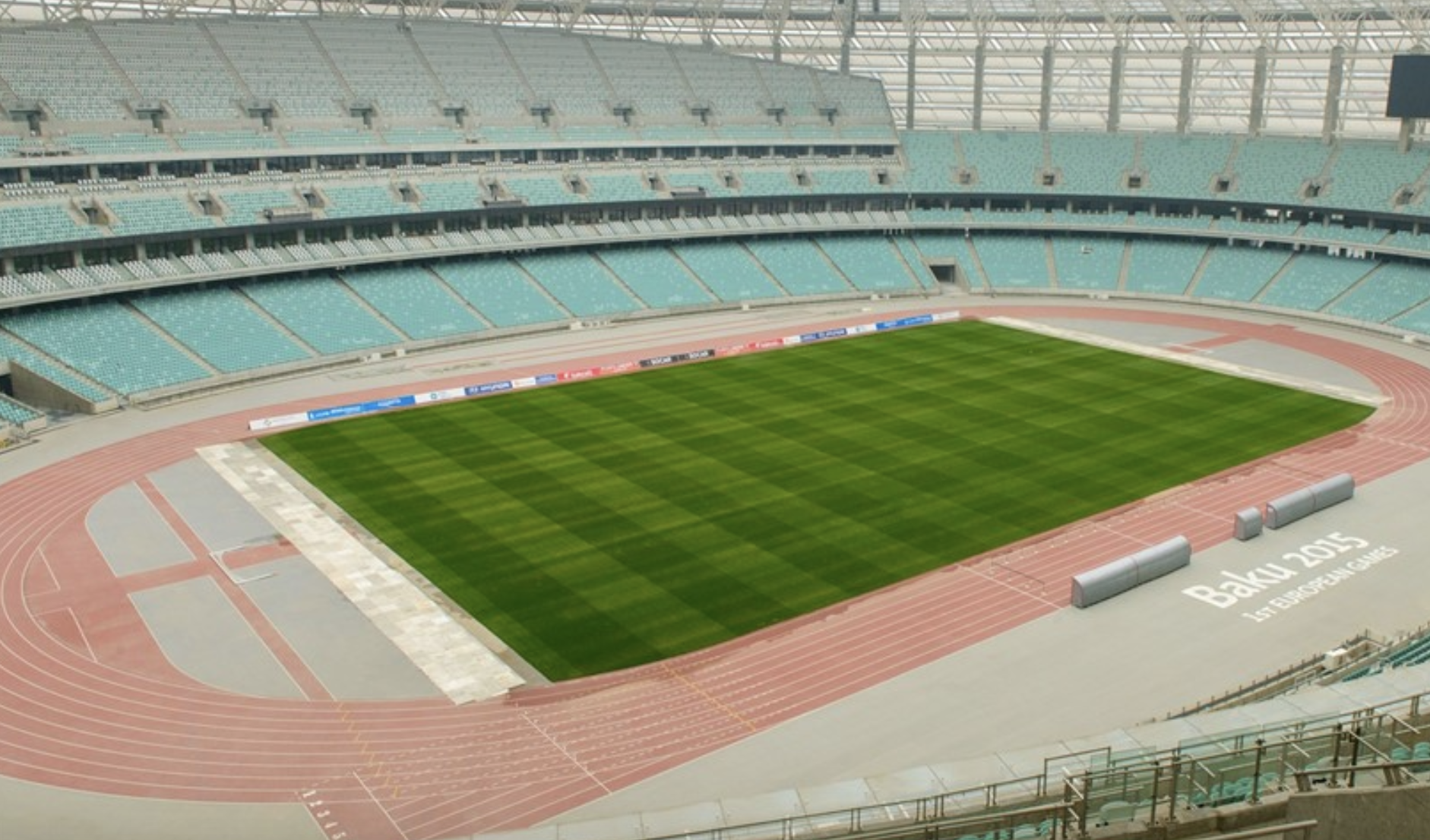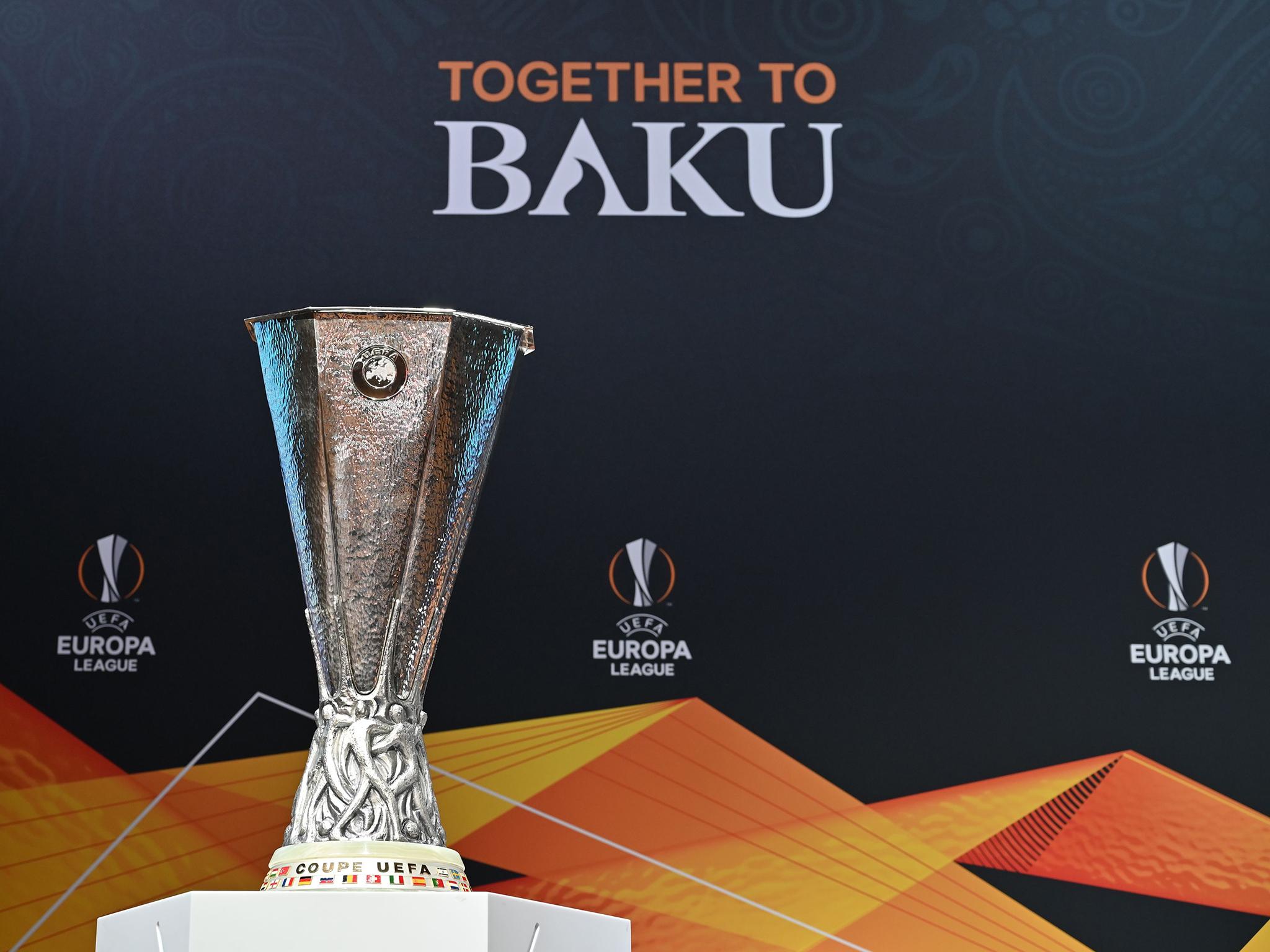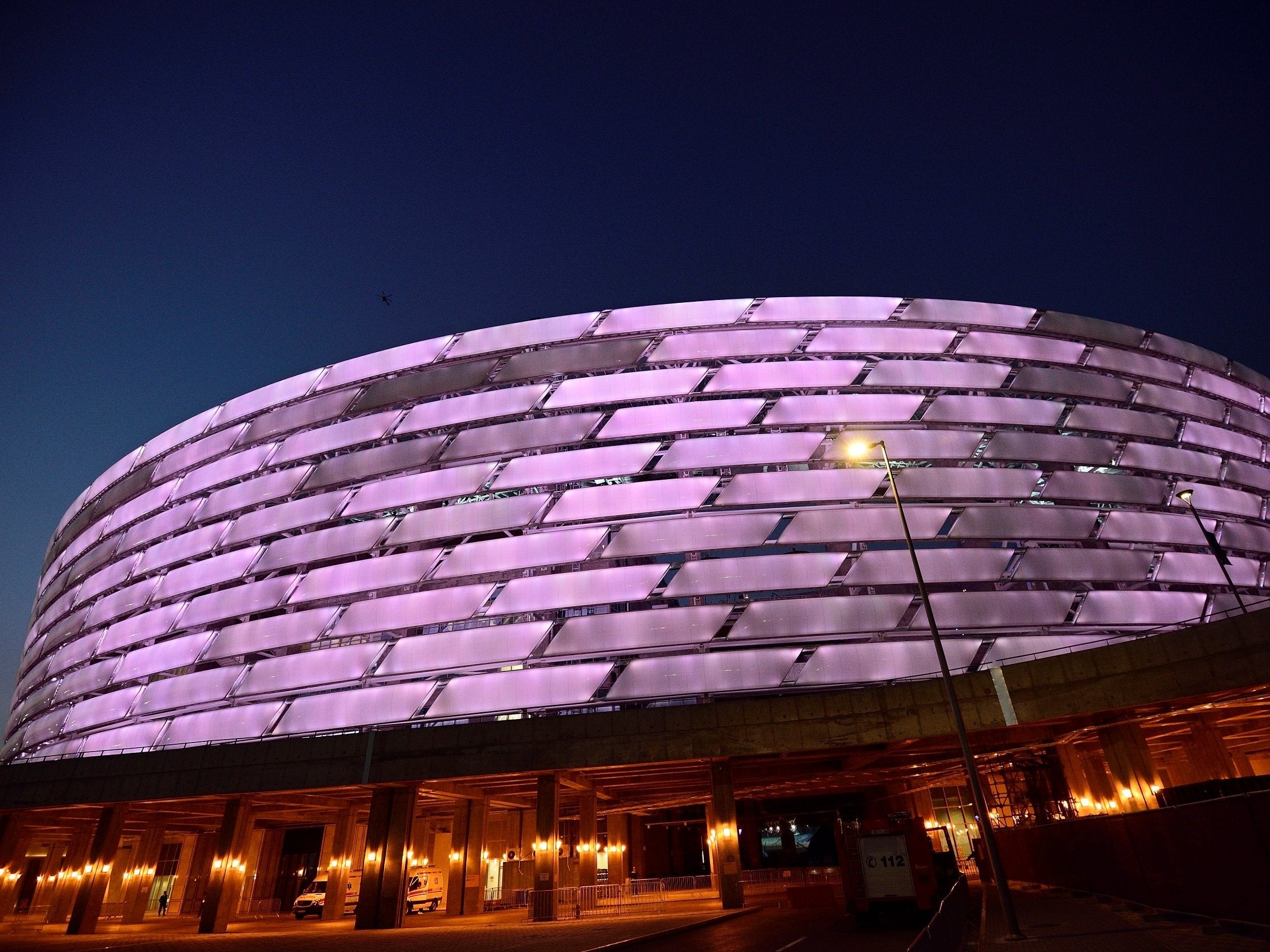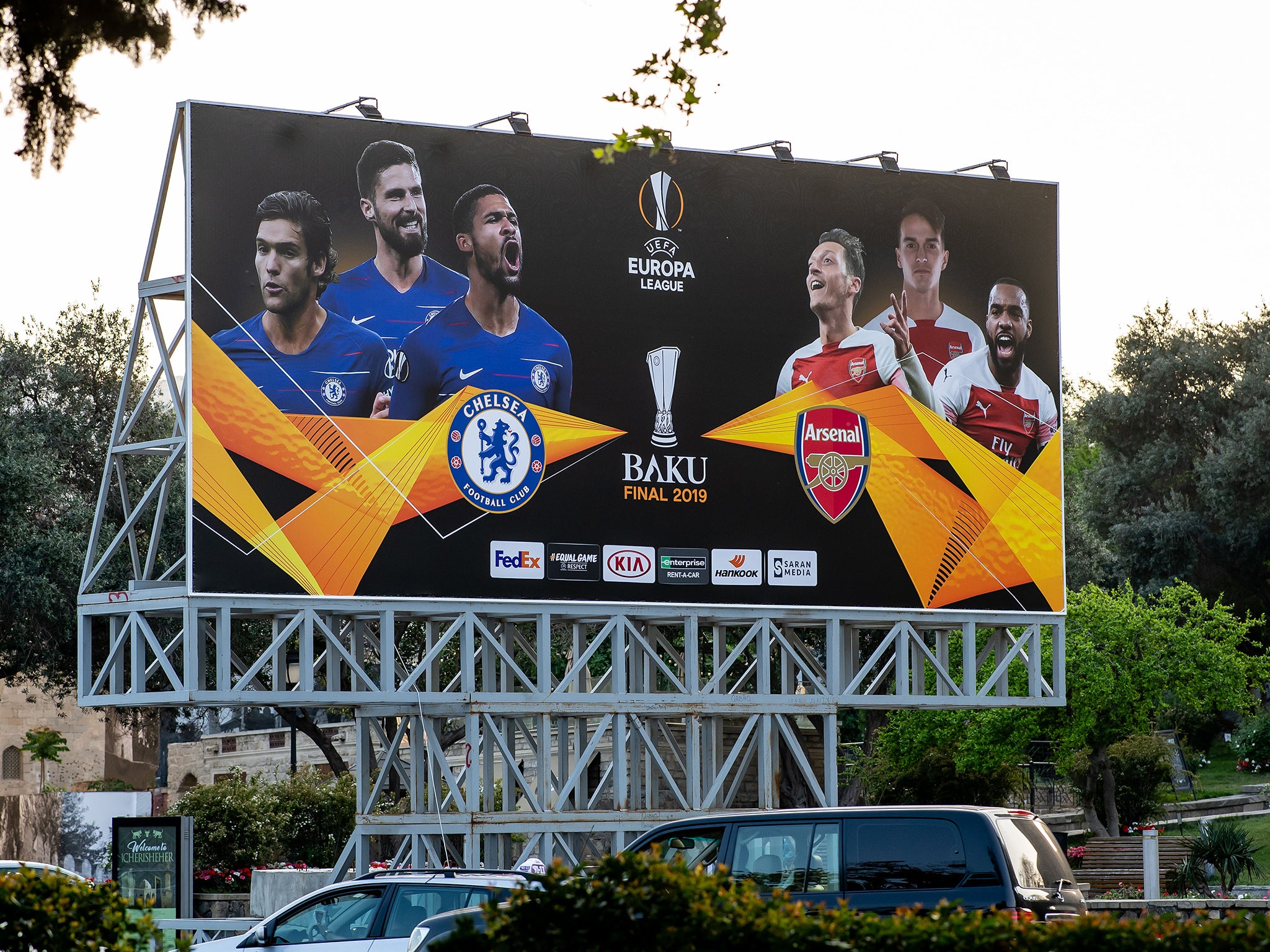Champions League and Europa finals prompt questions of whether Uefa’s bidding criteria is fit for purpose
Not only will Baku host the Europa League final, but it also bid for the Champions League. With an airport that can receive a maximum of 15,000 passengers and an ‘appalling’ human rights record, it is the latest exploitive move against football supporters

Your support helps us to tell the story
From reproductive rights to climate change to Big Tech, The Independent is on the ground when the story is developing. Whether it's investigating the financials of Elon Musk's pro-Trump PAC or producing our latest documentary, 'The A Word', which shines a light on the American women fighting for reproductive rights, we know how important it is to parse out the facts from the messaging.
At such a critical moment in US history, we need reporters on the ground. Your donation allows us to keep sending journalists to speak to both sides of the story.
The Independent is trusted by Americans across the entire political spectrum. And unlike many other quality news outlets, we choose not to lock Americans out of our reporting and analysis with paywalls. We believe quality journalism should be available to everyone, paid for by those who can afford it.
Your support makes all the difference.At a time when there is such worry over where exactly European football is headed, it is grimly fitting that so many concerns converge at the venues where this season’s European finals are headed. The build-ups to the showpieces in Baku and Madrid have been soured by: controversy over fans being financially exploited; the worry these same fans just aren’t being listened to; and so many questions about the motivations behind the game’s biggest decisions.
It is lamentable that, at a time of what should be great excitement, supporters groups from all four clubs - Arsenal, Chelsea, Liverpool and Tottenham Hotspur - have felt the need to come together and issue joint statements castigating their “disgraceful” treatment. They have also called for a “fundamental overhaul” of how Uefa deals with fans, but that might not be all the governing body needs to look at.
There is the very criteria as to how these matches are awarded.
There are admittedly different issues with the two finals – that touch on separate arguments – but they are linked by one fact that provokes more questions. Baku actually felt it could bid for the 2019 Champions League final as well as this season’s Europa League final, with its Olympic Stadium the only venue put up against Madrid’s Wanda Metropolitano.
Given the multiple problems Azerbaijan has already had hosting a mere Europa League final, it is mind-boggling to think how it could have staged the global mega-event the Champions League final has become.
It is the size of that premier event that has caused the primary issue for Liverpool and Spurs fans because of the disgraceful prices of tickets, but the issues with Baku can’t even get that - at least for visiting fans. They go much deeper.
It’s not that the clubs’ supporters can’t get tickets, it’s that they can’t even get into the country, because the airport can’t handle it.
Uefa admitted this in a statement explaining why Arsenal and Chelsea would only get 6,000 tickets each, putting it down to Baku’s inability to handle more than 15,000 travelling passengers.
“Offering more tickets to fans of the participating teams, without any guarantee that they would be able to arrange suitable travel to reach Baku, was therefore not a responsible option,” a statement read.
That, frankly, is absurd for an event like this - especially when there are similar questions over whether the local population can even afford the prices. It is also ludicrous that a supporter’s rare opportunity to see their team in one of football’s showpieces matches can be dictated by the small size of an airport alone. That illustrates it’s just not fit for purpose.
Uefa’s statement mentions that “supporters requesting tickets for a Europa League final can vary greatly from club to club”, while “the venue has to be chosen around two years in advance”.

Sources from the governing body state this rationale goes back to the 2015 final in Warsaw, where there was barely any take-up from supporters of Sevilla and Dnipro.
That’s understandable but the worst-case scenario shouldn’t be the baseline consideration. Especially not when Uefa themselves have it that eight Champions League clubs drop in to the competition, and that it then offers a route back to the Champions League. Hence six of the last eight finalists have among the most fervent travelling supporters groups in the world - in Liverpool, Manchester United, Ajax, Olympique Marseille and now Chelsea and Arsenal.
That, even going back two years, makes the selection of Baku all the more nonsensical.
For all the accusations about the motivation behind such choices, the body does creditably publish the Uefa Club Competition Finals 2019 Evaluation Report, for the purposes of transparency from when the bids were tendered.
Even this prompts questions.

The “Mobility” section in Baku’s bid for the Europa League final reads: “Due to its geographical location, most foreign spectators would arrive in Baku by air, resulting in high demand for flights. Heydar Aliyev International Airport is the only international airport within easy reach of Baku. The in- and outbound airport capacity meets the requirements.”
Those must be minimal requirements.
The “Mobility” section in Baku’s bid for the Champions League final, meanwhile reads: “The in- and outbound airport capacity theoretically meets the requirements.”
Theoretically. It’s hard to see how that theory would have withstood the reality of the tens of thousands looking to make their way for such a huge event.
That alone demands more scrutiny over the criteria.
But that alone isn’t the only element of Baku that warrants scrutiny.
Beyond a venue that can’t cope with more than 15,000 visitors, has minimal direct flights from major European cities and is in a timezone that may see the final finish at close to 2am local time, there are even bigger concerns. There is first of all the controversy over Henrikh Mkhitaryan due to Azerbaijan’s ongoing Nagorno-Karabakh conflict with Armenia, and then the very nature of the government.
Ilham Aliyev is a president last year voted in for a fourth successive term in elections that Human Rights Watch say lacked competition and “took place in a restrictive political environment and under laws that curtail fundamental rights and freedoms”, and who has presided over a regime with an “appalling” human rights record. Azerbaijan have already so strategically tried to use sport to whitewash that regime, from sponsoring Atletico Madrid to hosting Formula One and the 2015 European Games. Hosting a prestige European final and Euro 2020 matches is only another part of that.

Jurgen Klopp has described Baku’s staging of this showpiece as “irresponsible” due to the difficulty of travel, but that description could refer to other aspects of it.
There’s then the other moral argument over the needless carbon footprint of a final so far away.
So while it is probably too late to change the venue, it should prompt bigger questions for the future.
That is precisely what staging the 2017 Champions League final in Cardiff did, if for much more mundane reasons.
Senior Uefa sources were adamant that all future hosts for their showpieces event would have to be much bigger cities, with far better infrastructures. Some were expressing this view as they stood in the packed bars of the Hilton Hotel, in the middle of a crammed city centre. Cardiff was so bursting at the seams that many supporters were forced to stay over 60 miles away.
Many Uefa sources just felt it was too small for such a huge event, and say it has influenced decision-making since.
This cuts to a core issue with much of this.

While Uefa’s aim to spread such finals - and thereby the game - around Europe is obviously noble and deserves backing, it shouldn’t overrule the comfortable and responsible hosting of these events.
The common complaint in these circumstances is that will mean it too often goes to the same few cities, but that is to look at it the wrong way around.
It should be logical - and paramount - that a global mega-event like a Champions League final should only be held in venues comfortably capable of hosting it.
Safety and convenience should trump all in that regard. A venue should not have to overly stretch itself. A city should be able to comfortably absorb a showpiece of this size. Anything else genuinely is irresponsible.
That is what the event has become. That is what the Europa League final, in years like this, can occasionally get close to. It warrants another serious look at the criteria.
The situation has improved since Uefa returned to competitive bids after years of awarding finals to favoured cities, but that can still be honed further.
As with Baku, if a city or airport can’t handle what would be the average foreign attendance from recent finals, then it shouldn’t be hosting it. It really is that simple. It is also why it is right the Super Cup gets shared around as recompense.
Some of those criteria are even failing supporters for Madrid, a city that clearly can comfortably host a Champions League final.

Aside from the exploitative cost of tickets, the joint supporters’ statement complains of hotel rooms going for “over £1,000 a night” and “stories of room bookings being cancelled and resold at vastly inflated rates”.
This is despite Uefa’s evaluation report reading that “Madrid city council has guaranteed its best endeavours to ensure that hotel rates during the event would be fair”.
What constitutes best endeavours needs to be looked at.
So, evidently, does the very hosting of these finals. Otherwise we're still headed for the disregard or exploitation of supporters.
Join our commenting forum
Join thought-provoking conversations, follow other Independent readers and see their replies
Comments